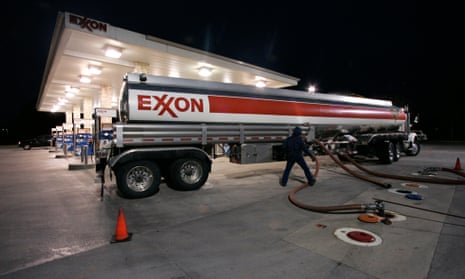ExxonMobil shareholders will not be able to vote on whether the oil company should stop investing in risky, high-carbon projects after failing to win support from the Securities and Exchange Commission this week.
Wednesday’s decision not to require the proxy vote comes a week after the federal agency ruled in favor of including a near-identical shareholder proposal on the Chevron proxy ballot in May.
Both proposals, represented by Arjuna Capital and nonprofit As You Sow, aim to pressure oil companies to stop investing in expensive fossil-fuel extraction projects – such as ultra deepwater, arctic drilling and tar sands projects – and instead share that money with investors as dividends.
An attorney-adviser for the SEC said that the commission’s decision stemmed from its conclusion that Exxon has already partially implemented the proposal by increasing dividends.
Natasha Lamb, director of shareholder engagement at Arjuna Capital, called the ruling bizarre, confusing and based on a technicality. “It’s a very odd ruling in part because even if dividends and share buybacks are going up, a shareholder still has the right to increase in the amounts of capital distributed.”
“It seems as though they are grasping at straws for a reason to not to [uphold shareholders’ demands],” she said.
Last week’s ruling on Chevron was the first time the SEC upheld a shareholder proposal for increased returns based on climate change.
Chevron initially challenged the resolution, but the SEC’s ruling means that the issue will now go to a vote at Chevron’s annual shareholder meeting on May 27.
Many oil companies have been facing pressure from investor groups to disclose financial risks from climate change. The pressure comes on top of the challenge sometimes described as “peak oil”, or the rising costs of maintaining production volume as the easiest-to-get reserves are depleted.
The easy oil is gone, Lamb said. Oil companies are scrambling to invest in oil that’s harder and more expensive – and therefore less profitable – to extract in a bid to keep up production. Ultra-deepwater drilling, Arctic drilling and tar sands projects, for example, “cost a lot more money and are carbon-intensive”, Lamb said. “What we’ve seen in the industry over the last 10 years is that capital expenditure has increased 100% – it has doubled – and crude oil production has actually decreased 3%.”
Some shareholders are concerned not only about the immediate risk of reduced returns, but also the longer-term risk of investing in fossil-fuels projects that could end up being unprofitable and unsaleable if governments cap emissions amid global climate talks. Several studies have concluded that much of the world’s fossil fuel reserves must remain unburned to prevent catastrophic climate change.
So-called “stranded” assets could cause major damage to oil companies’ profitability, Lamb said. “The risk [is] that we can only pump that much CO2 into the atmosphere before we cause catastrophic climate change,” she said. “These companies should be forward-thinking and make strategic decisions that position them as not just fossil-fuel companies, but energy companies.”
In a report in April, ExxonMobil wrote that it doesn’t expect any of its fossil fuel reserves will be stranded. Meanwhile, in a shareholder letter in May, Shell said it doesn’t believe any of its proven reserves will become stranded either.
Rising shareholder interest in assessing the impact of climate change on business has attracted the attention of corporate boards: the BP board last month endorsed a shareholder proposal asking for more disclosure about climate risk, after the Shell board endorsed a similar proposal in January.
As for the latest SEC ruling, Arjuna Capital has not decided whether it will challenge the decision.
Danielle Fugere, president of As You Sow, said the ruling is not in shareholders’ best interests, adding that shareholders have the right to demand increased dividends when a company’s current investments put it at risk.
“We will continue to press this with the company to get other shareholders on board, to continue to ask the company to take action and decrease spending on these projects,” she said. “We won’t go away.”

Comments (…)
Sign in or create your Guardian account to join the discussion